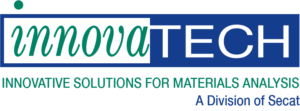
GC/MS Analysis Services from Innovatech Labs
GC/MS Analysis Services from Innovatech Labs – GC/MS analysis or GC/MS testing, short for gas chromatography mass spectrometry, is an incredibly powerful analytical tool—and one of our most-requested lab services. It’s ability to separate, identify, and quantify the individual components of a sample makes it an ideal tool for manufacturers or researchers hoping to identify contaminants, trace elements, strange odors, and more.
Use the tabs below to learn more about what GC/MS testing is and its wide-ranging industry applications, examples, techniques, and Innovatech Labs’ GC/MS lab services, our process, capabilities, and sample requirements.
Contact Us to Learn More About Our GC/MS Lab Services
Every testing and analysis project is unique. Our experienced team of analytical scientists can recommend the best testing and analysis procedure for your needs. Get in touch with us by at 888-740-5227 or feel free to submit a quote request.
Learn More About GC/MS
• How GC/MS Works
• Deconstructing GC/MS Analysis
• Headspace GC/MS




